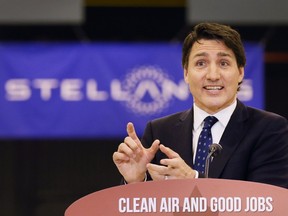Article content
Justin Trudeau’s imminent exit from office may mark the beginning of the end of a 10-year war on Canada’s energy sector, and by extension, Canada’s economy.
Advertisement 2
Article content
Article content
Recommended Videos
Article content
Canada is the world’s fourth-largest oil producer, currently supplying 6% of global production. Canada is the fifth-largest producer of natural gas, supplying 5% of global demand. The energy sector (oil, gas, electricity) constitutes more than 10% of Canada’s total gross domestic product (GDP). In 2023, the latest year of available data, the energy sector provided, directly and indirectly, almost 700,000 jobs or 3.5% of all jobs in Canada. And Canadian energy exports totalling $200 billion comprised 28% of all Canadian exported goods.
But however vast and vital Canada’s energy sector is to our well being, Prime Minister Trudeau worked tirelessly to restrain, restrict, diminish and ultimately “phase out” Canada’s fossil fuel industries. Here are some of the highlights of his war on Canada’s energy sector.
Article content
Advertisement 3
Article content
In 2017, Trudeau introduced Bill C-48, which restricts oil tankers off Canada’s west coast and limits the ability of Canada’s oilsands sector to export product to new markets, keeping Canada’s energy resources trapped in a discount-price U.S. market. Also in 2017, much to the fury of many Albertans, Trudeau announced his intention to phase out oilsands production, the foundation of Alberta’s prosperity.
In 2018, Trudeau introduced Bill C-69, which tightened Canada’s environmental assessment process for major infrastructure projects and made the process of obtaining government permission for major energy projects more costly, time-consuming and arbitrary, thus increasing uncertainty across the energy sector. And he introduced the carbon tax despite strenuous opposition by Canada’s energy sector and energy-producing provinces.
Advertisement 4
Article content
In 2020, Trudeau launched his broadest and most intense regulatory crusade against Canada’s energy sector, introducing Bill C-12, which committed Canada to reach “net-zero” emissions of greenhouse gases by 2050. Net-zero means Canada cannot emit more greenhouse gases via energy production and consumption than is taken out of the air by natural processes and the ecosystem. This would require vastly reduced production and consumption of fossil fuels in Canada, with consequences for the energy sector’s productivity and employment potential moving toward 2050.
In 2023, Trudeau attacked fossil fuel use in the transportation sector by mandating that all new cars sales be electric vehicles by 2035. And he released draft “clean electricity regulations” to phase out the use of fossil fuels in electricity generation by the year 2050.
During his time as prime minister, Trudeau attacked Canada’s energy sector, with eliminationist language and onerous regulations meant to essentially phase out a major supplier of economic productivity and employment in Canada, to the great detriment of Canadians.
Hopefully, the next prime minister will reject Trudeau’s anti-energy agenda and have the will and ability to rescind the many damaging laws and regulationst the Trudeau government has inflicted on a vital sector of the Canadian economy.
Kenneth Green is a senior fellow at the Fraser Institute.
Article content




